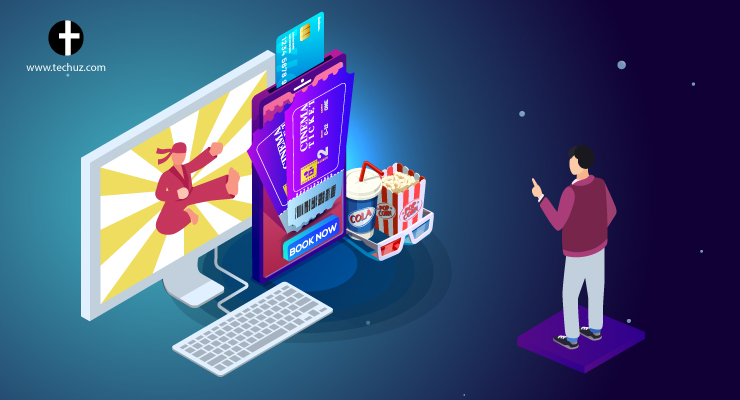Posted on
August 21, 2019
Updated on
March 26, 2024
Read time
 12 mins read
12 mins read
The online movie ticket booking market has seen robust growth in the past few years, and under no circumstances it seems to slow down.
Explaining the industry’s epidemic growth, a report by Grand View Research states that the online movie ticket booking global market was valued at $17.98 billion in 2018 — and is expected to increase at a CAGR of 6.5% between 2019 and 2025.
One of the primary reasons for this exponential growth is consumer’s demand for convenient, hassle-free and on-the-go purchases. No one likes to wait in long queues — and the facility to select preferred seats in advance is an absolute joy. In addition, smartphones and easy internet access have aided its growth.
But these factors are just one side of the story.
The ticket booking platforms, the design and user interface, features, technology and APIs have played a pivotal role in enhancing the online experience and attracting customers.
At Techuz, we have experience in developing online movie booking apps and we know what it takes to develop such a platform. So we decided to share some insights with you. In this article, we’ve covered:
- An overview of an online ticket booking platform
- Essential features for users
- Essential features for admin
- List of technologies used for different features
So if you are looking to develop an online movie ticket booking platform and want to get some insights on what it takes to develop one, this article will guide you through.
We answer all these questions and more in this blog:
Overview of a Movie Ticket Booking Platform
An online ticket booking platform facilitates selection, reservation and purchase of tickets for the movies. This type of platform primarily contains:
- Information such as show movie schedule, trailers and price of the tickets.
- A ticket booking system that allows the user to select and book seats and even purchase the tickets.
- List of theaters and venues.
- Check and post reviews and ratings of the movies.
Must-Have Features for a Movie Ticket Booking Platform
Now talking about features and functionalities, both the user and admin side of the platform must contain the following essential features. Let’s start first with the user side.
FEATURES FOR USERS
User Registration and Login Screen
User registration and login screen are the basic features of the ticket booking platform. Generally, the user gets two options on registration or login page.
I. Create a platform-specific account – The user provides the necessary details such as email address or phone number and creates a password for the platform. Once done he has to enter the created credential to log in.
II. Register with social accounts – Here users can sign up using their existing social accounts such as Gmail or Facebook.
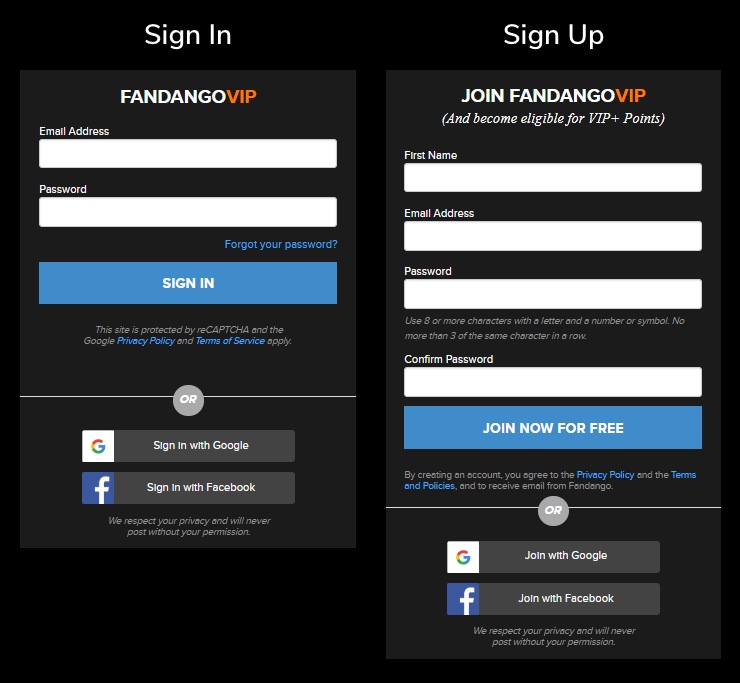
(Login and registration page – Fandango)
Apart from these two, you can also provide an additional option to use your platform without registration or login. With this option, there is no need for registration and the user can purchase tickets as a guest through guest checkout.
Although this option is not mandatory to have, adding it on the platform has its own benefits. As per a report by Baymard Institute, 34% of the user abandon at the checkout because they don’t want to create an account.
Moreover, if you want to motivate the user to signup for the process, you can add rewards programs for the registered users along with the guest checkout. This way your platform would serve to both types of users who just want to make a purchase without registering and the frequent users who would like to register and earn rewards.
Location Selection
The platform must identify the user’s location to provide the information about the venues, movie shows and timings in their vicinity. The user can either manually select their location by choosing the city or entering the zip code or even provide an accurate location through GPS.

(Select location by entering zip, city or movie name – Fandango)
Homepage
Homepage or home screen is the main page of the platform that provides users with all the necessary information and also navigation to other features.
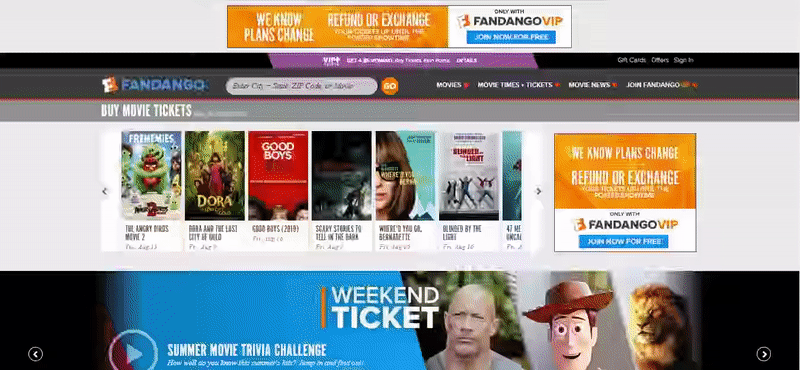
(Homepage – Fandango)
Primarily, the home screen displays the lists of movies that are being shown in theaters. From there, the user can search the movie using the search bar and can even filter the shows based on his preference such as genre, languages, 2D, 3D, venue, etc. Further, users can get more information about the movies by clicking on them individually.
Moreover, the homepage also displays information about any promotions, offers, upcoming events, advertisements, trailers of the movies and more. Even other features such as user account, settings, reward points, etc. are navigated through the home screen.
Suggested Read: How to Boost Conversion Rate with Web Design?
Details of the Movie
Once the user selects the movie, he is navigated to another page that gives details about the movie such as its synopsis, trailers, featured interviews or news, information about the cast and crew, runtime and reviews & ratings.
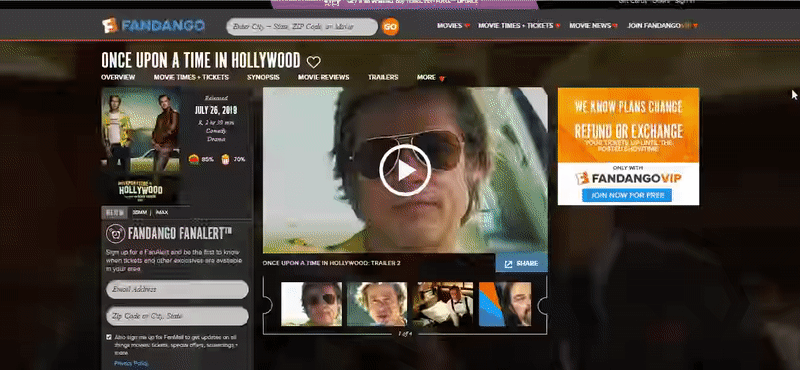
(Page providing details of the movie – Fandango)
Online Ticket Booking Process
The users can book the ticket by clicking on the desired movie from the list. They get to select options such as time of the show, theater, number of seats, type of seats and the position. Here’re its details.
- The user gets to select the format of the movie such as 2D, 3D, 4DX 3D or even the language.
- Selection of the theater where the movie is screened and the preferred showtime.
- The number of seats to be booked, the location of seats and tire of the seat from the seat layout. You can also put a limit on the number of seats per purchase.
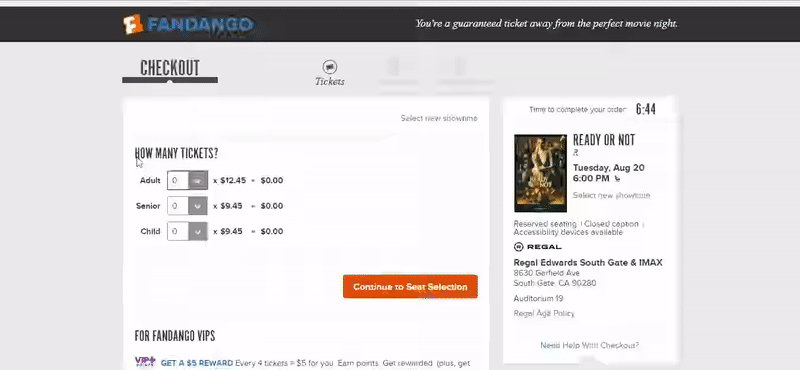
(Ticket selection and seat booking – Fandango)
Ticket booking feature is the most fundamental part of the ticket booking platform and there are technical as well as graphical components that you’ll have to consider. Such as :
- The mechanism for retrieving information from different theaters about the availability of seats and tickets. We here at Techuz have used RTS API for one of our clients to retrieve the information such as seating charts, seats sold out, the number of seats available and the type of seats offered by the theater.
- Placing a hold on the selected seats for a certain period of time while the user makes the purchase.
- Session timeout if the user spends more than the stipulated time for the booking so that even other users get a chance to select the seats.
- Design an intuitive and easy to use seating chart employing color code for unavailable seats or highlighting the selected seats.
Payment Processing
Once the user selects the seats the next step is to make the purchase. It is essential to make sure the experience is convenient and safe — and for this reason, you need to consider the following factors.
- Security
When the sensitive pieces of information like credit card numbers or bank account details are involved, the security of the data must be the prime concern. As per a survey by eConsultancy, 58% of the users drop at the checkout page due to security concern. Thus, you must ensure that all necessary measures required to safeguard the information are taken carefully. For instance, you must comply with the best security practice and standards such as PCI Security Standards Council (PCI SSC), use SSL encryption for the platform as well as consider OWASP’s guidelines of web vulnerabilities.
- Provide different payment methods
As per an infographic by Milo, 56% of users expect a variety of payment options on the checkout page. This means your payment system should support the majority of the credit cards, debit cards, e-wallets, gift cards or even loyalty points.
- Selecting the right payment gateway
There are varied options of payment gateways you can select from. Each serves the same purpose but some provide different functionalities and features. Do a little bit of research while selecting the payment gateway that perfectly suits your needs. For instance, as per our client’s need Stripe Standard came to be the best choice. The payment system made it easy to collect the commission from theaters soon after the tickets are purchased from the platform.
Reviews and Ratings
Review and rating feature simply allows the users to rate the movie and share their experience and reviews in the comments. This feature is also useful for other users to make their purchase decision about the movie.
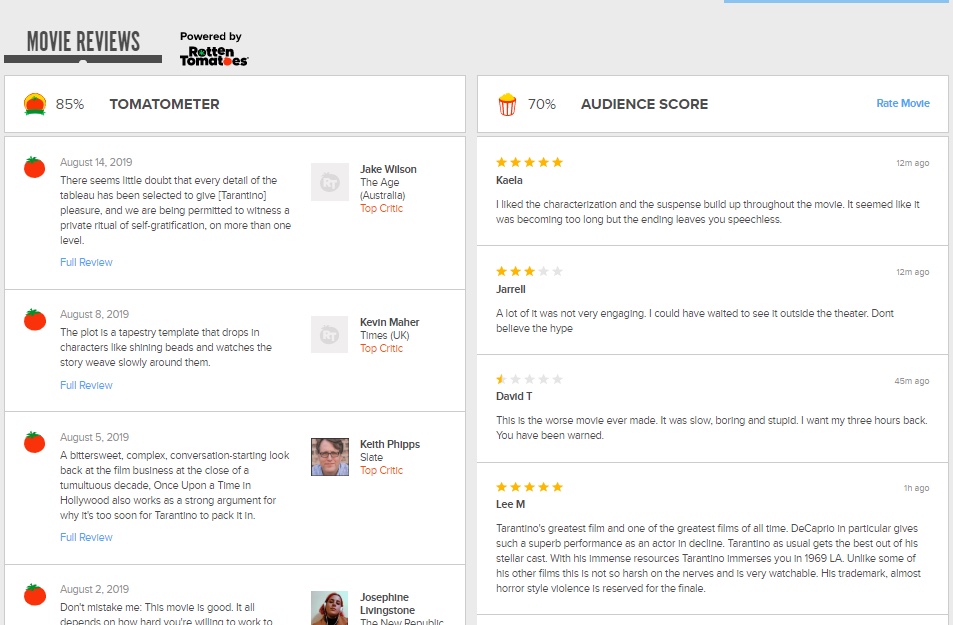
(Tomatometer and audience score – Fandango)
Apart from the reviews by the users on your platform, you can also integrate the third party reviews just like Fandango did by integrating Tomatometer — movie reviews by Rotten Tomato.
Download and Email the E-Ticket
Rather than collecting the ticket from the theaters, this feature gives the user tickets in an electronic form such as PDF and a barcode. As soon as the purchase is made, an electronic ticket is generated and sent on the user’s email address that can be scanned directly from their mobile upon their arrival at the show. This feature can save a lot of time for both users as well as the theaters.
Loyalty Program
Loyalty or reward programs are widely used by retail and e-commerce industry to retain customers and foster brand loyalty. As per a report, a business has to spend about 5-25X more to acquire a new customer than selling to an existing one. Another research shows that existing customers spend 67% more than new customers. Thus, adding a loyalty program on your ticket booking system can massively help you to boost your business profitability.
For an online movie ticket booking platform, you can integrate a loyalty program where the user earns certain reward points for every purchase of the tickets. These accumulated points can then be redeemed on the platform to purchase more tickets.
FEATURES FOR ADMIN
Login
A login page for the admin to access the platform.
Admin Dashboard
An admin dashboard that provides an overview of the platform including activities on the application, list of movies and theaters, data about the booking, total number of users (registered and guest users), total earnings and filter it by movies and theaters, business stats and performance and other necessary data you need to manage the platform.
Manage Shows
This feature allows the admin to view, add, remove and manage the shows on the platform. They can add details of the show such as time, venue, the price of the tickets and more.
Manage Venues
Apart from the shows, admins can also add and manage the venues on the platform. They can add or remove the theaters associated with their platform as per contract and agreement.
Manage Earning
This dashboard gives the admin an entire overview of the earnings on the platform. He can view the earnings, filter and sort by data, movies, venue, location and more. This dashboard provides features necessary for management such as calculating the total earning, commission amount and reports on payment methods.
Content Management
A content management system for the app where the admin can update and edit the content such as blogs, multimedia and promotional offers.
Push Notifications
Push notification is another primary feature for the ticket booking platform. This feature allows the admin to send push notifications directly to user’s devices and share information about the shows, timing, promotions or reminders.
Technologies We Recommend for the Development
- Frontend, UI: Angular/ React
- Backend: Node.js/PHP
- Backend Frameworks: Laravel/Express.js
- Server: Java, Nginx
- Security Authentication: JSON Web Token
- Database: Amazon Relational Database Service (RDS)
- Caching: Cookies for the in-memory cache
- Email Notification: Google SMTP
- Push Notification: RabbitMQ
- Payment API: Paypal, Stripe
- Deployment: Beanstalkapp
- Code repository: Git
- Logging: Laravel Log Manager
- Load balancer: AWS Elastic Load Balancing (ELB)
- Barcode generation: Laravel
So the above are the necessary features and technology that you need for your ticket booking application. However, it’s not just the features but also the revenue model that you need to consider for your platform. Popular ticket booking platforms follow the two common revenue models. They are commission on tickets and advertisements on the platform.
Revenue Model
Commission on tickets – The platform charges a certain amount of commission on the ticket booking either from the consumer or theaters or even both.
Advertisements and promotions – Along with the commission, you can also earn revenue by displaying advertisements on the platform. Many ticket booking apps even promote the movies by featuring exclusive interviews and content on the platform.
Wrapping Up
No doubt, ticket booking platforms have made the movie ticket booking process convenient and easy. And anything that provides convenience to the consumer is here to stay. The above are a few essential features that any movie-ticket-booking platform should have. Apart from these, the success of the project also depends on how it is executed — the design and the code quality. Moreover, hiring an experienced development company that has on-hands experience in developing such projects can make a vast difference. Hope you enjoyed reading it. If you have any query about developing an online movie ticket booking platform, feel free to contact us.
